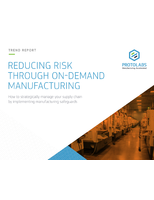Workstation automates processing of protein microarrays.
Share:
Press Release Summary:
ProteinArray Workstation employs microfluidics system, full software control interface, and bar code tracking capability. Workstation, composed of one ProteinArray Processor, can process up to 12 microscope slide-based protein microarrays with assay times of 1-2 hours. System uses sample volumes as low as 75 microliters. Totally unattended operation injects up to two separate samples per microarray. System also automates Tyramide Signal Amplification (TSA(TM)) chemistries.
Original Press Release:
PerkinElmer Life Sciences Discloses Details of New ProteinArray Workstation
The First of its Kind Workstation that Fully Automates the Processing of Protein Microarrays
BOSTON-May 28, 2002-PerkinElmer Life Sciences, a leading provider of drug discovery, life science research and clinical screening technologies and services, today disclosed details of the new ProteinArray Workstation, the first workstation to completely automate the processing of microscope slide-based protein microarrays. The ProteinArray Workstation was developed as part of a collaborative development agreement with NextGen Sciences Ltd., (Huntingdon, Cambridgeshire, United Kingdom), a fast track platform technology development company specializing in the genomics, transcriptomics and proteomics fields, using NextGen Sciences derived intellectual property.
The ProteinArray Workstation employs a unique microfluidics system, full software control interface and bar code tracking capability for future integration into PerkinElmer's other protein microarray technologies (Spot Array(TM) Printers, ScanArray(TM) Slide Scanners and the HydroGel(TM) 3-dimensional protein microarray substrate). Key to its operation is the ability of the ProteinArray Workstation to automate almost any protein microarray assay. A ProteinArray Workstation composed of one ProteinArray Processor can process up to 12 protein microarrays with assay times of 1-2 hours, depending on the type of assay used. The system can be further expanded to process up to 48 protein microarrays using a maximum of four ProteinArray Processors per workstation. The system has been developed to use very low sample volumes (75 microliters), which is particularly important where sample amounts are small.
The workstation has the unique capability for automated sample introduction to enable totally unattended operation, and can inject up to two separate samples per protein microarray. The first sample could, for example, be the analyte and the following sample the second antibody of a specific sandwich assay pairing. The system has been developed with an on-line reagent blending facility, which saves reagent preparation time and provides for gradient washing capability, allowing for the optimization of washing stringency for each assay performed.
An additional unique capability of the system is the automation of the Tyramide Signal Amplification (TSA(TM)) chemistries from PerkinElmer Life Sciences. TSA employs an enzyme-mediated detection method that uses the catalytic activity of horseradish peroxidase to generate high-density labeling of a target protein, the detection of which can be significantly amplified. This facility is particularly important where the proteins of interest are in low abundance and not detectable without this 10-to-100 fold increase in signal amplification. By automating the TSA chemistry, the ProteinArray Workstation saves many hours of incubation and washing steps, and removes variability from the assay procedure.
The ProteinArray Workstation has been validated for a number of key assays, including protein expression analysis, selection of content and high specificity binders, antibody profiling, and protein-protein interaction studies. These microarray-based assays are key high-throughout methodologies that will be used in the generation of proteomics information, acceleration of the drug discovery process and, in the future, for clinical and diagnostic applications.
"The ProteinArray Workstation is the most flexible, reproducible and fully automated system for processing multiple protein microarrays," said Paul Gillyon, vice president and general manager, Biomics, PerkinElmer Life Sciences. "It is an excellent and timely addition to our product portfolio, and completes our suite of technologies for protein microarray-based applications."
About PerkinElmer Life Sciences
PerkinElmer Life Sciences is a global provider of drug discovery, research, and clinical screening products, services and technologies for the life science industry. Incorporating Packard®, NEN®, and Wallac(TM) product brands, PerkinElmer Life Sciences offers a complete line of instrumentation, reagents and consumables, as well as assay development and instrumentation systems for high-throughput screening and other areas involved in target validation for drug discovery.
For more information, contact: PerkinElmer Life Sciences
549 Albany Street, Boston, MA, 02118, USA; Telephone: (800) 551-2121 (U.S. Only) or +1 (617) 482-9595; Fax: +1 (617) 482-1380. Website: www.perkinelmer.com/lifesciences
For further information:
Jim Monahan
PerkinElmer Life Sciences
(617) 350-9618
james.monahan@perkinelmer.com
Helen Shik/Jayme Maniatis
Schwartz Communications, Inc.
(781) 684-0770
perkinelmerlife@schwartz-pr.com




